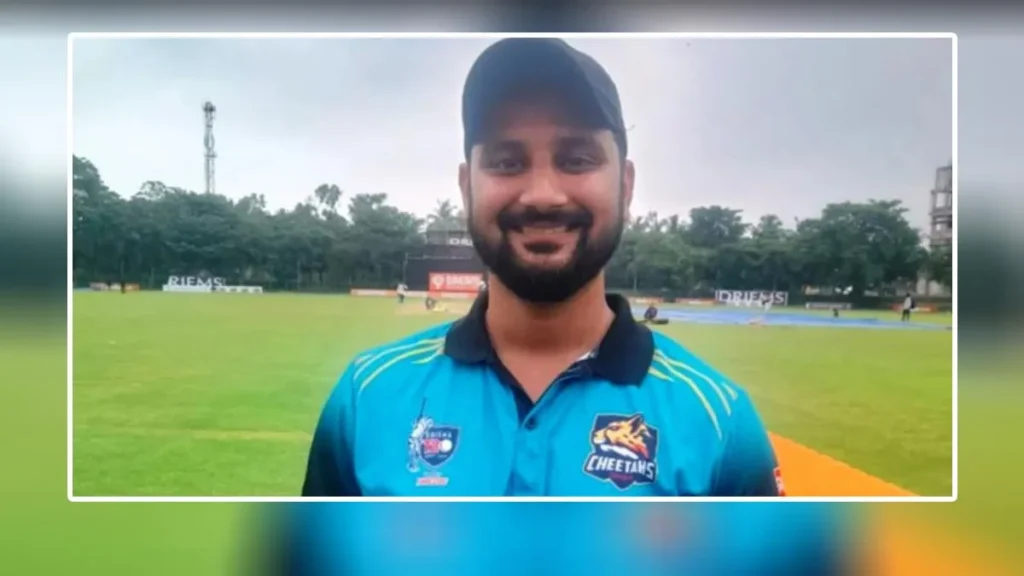In a shocking turn of events, the Board of Control for Cricket in India (BCCI) has imposed a two-year ban on promising Odisha cricketer Sumit Sharma for committing age fraud. The 28-year-old left-arm spinner, who was a key member of Odisha’s Ranji Trophy team, has been disqualified from participating in any BCCI domestic tournaments until 2026 after an investigation uncovered that he submitted conflicting birth certificates.
The Rise and Fall of Sumit Sharma
Sumit Sharma, born on September 8, 1995 in Cuttack, Odisha, emerged as a talented all-rounder in the state’s cricketing circles. With his left-arm orthodox spin and handy contributions with the bat lower down the order, Sharma quickly became an integral part of Odisha’s plans across formats.
His consistent performances in the domestic circuit earned him recognition, and he seemed poised for higher honors. However, just as his career was on the ascent, the age fraud scandal has brought it to a screeching halt.
The Inconsistencies That Led to The Ban
The BCCI’s disciplinary committee launched an investigation into Sumit Sharma’s age discrepancies after irregularities were found in his birth certificates. It came to light that Sharma had furnished different dates of birth during his junior-level cricket career.
Records indicate that Sharma registered his birth date as September 8, 1995 on some occasions, while on others, he mentioned it as September 8, 1997. These inconsistencies dated back to the 2015-16 domestic season when Sharma was playing age-group cricket.
Sanjay Behera, the secretary of the Odisha Cricket Association (OCA), shed light on the matter, stating, “Sumit Sharma, a member of the Odisha Senior Men’s Team, has been prohibited from participating in BCCI Domestic Tournaments for the next two years due to his submission of conflicting age certificates during his junior-level play in the 2015-16 season.”
The discrepancies in Sharma’s age came under scrutiny when he was all set to represent Odisha in their Ranji Trophy opener against Baroda. On the eve of the match, the BCCI’s disciplinary committee served him a suspension notice, forcing the OCA to make last-minute changes to their squad. Tarini Sa was named as Sharma’s replacement for the crucial game.
The Consequences of Age Fraud
Age fraud is a serious offense in cricket, particularly in age-group tournaments where players’ eligibility is determined by their date of birth. By submitting false age documents, players gain an unfair advantage over their peers, skewing the level playing field.
The BCCI has taken a stern stance against age fraud in recent years, cracking down on players who falsify their age records. In Sumit Sharma’s case, the two-year ban serves as a strong deterrent to others who might consider manipulating their age documents for short-term gains.
The ban effectively puts Sharma’s promising career on hold, depriving him of valuable opportunities to showcase his skills and progress through the ranks. It serves as a reminder that honesty and integrity are non-negotiable values in the sport.
The Way Forward
As Sumit Sharma serves out his suspension, the Odisha cricket fraternity will have to rally together and fill the void left by his absence. The state team will need to identify and groom new talent, especially in the spin department, to maintain their competitiveness in the domestic circuit.
For Sharma, the road to redemption will be long and arduous. He will have to use this time away from the game to reflect on his actions and work on rebuilding his reputation. The 28-year-old will be 30 by the time his ban ends, and he will have to work twice as hard to regain the trust of his teammates, coaches, and the cricketing authorities.
The age fraud scandal serves as a cautionary tale for young cricketers aspiring to make it big in the sport. It underscores the importance of honesty, integrity, and playing the game in the right spirit. Cricketers must understand that success achieved through deceit is short-lived and ultimately detrimental to their careers.
The BCCI’s Stance on Age Fraud
The BCCI has been unequivocal in its stance against age fraud, treating it as a grave offense that undermines the spirit of the game. In recent years, the board has intensified its efforts to weed out age fraud from cricket, particularly at the junior level.
The board has implemented stringent measures to verify players’ age, including the use of bone density tests and the scrutiny of birth certificates. Players found guilty of age fraud face severe consequences, ranging from suspensions to lifetime bans, depending on the gravity of the offense.
| Offense | Punishment |
|---|---|
| First age fraud offense | 2-year ban |
| Second age fraud offense | 5-year ban |
| Third age fraud offense | Lifetime ban |
The BCCI’s graded punishment system for age fraud offenses
The BCCI’s zero-tolerance approach to age fraud has sent a strong message to the cricketing community that such malpractices will not be tolerated. By cracking down on age fraud, the board aims to create a level playing field for all cricketers and maintain the integrity of the sport.
The Impact on Odisha Cricket
Sumit Sharma’s suspension is a significant blow to Odisha cricket, given his stature as a key member of the state team. His absence will be felt across formats, particularly in the Ranji Trophy, where he was expected to play a crucial role with both bat and ball.
The OCA will have to work closely with the state’s coaching staff to identify and groom young talent to fill the void left by Sharma’s suspension. The association will also need to reinforce the importance of integrity and fair play among its cricketers, ensuring that such incidents do not tarnish the state’s cricketing reputation in the future.
Lessons Learned
The Sumit Sharma age fraud case serves as a stark reminder of the consequences of dishonesty in cricket. It highlights the need for players, coaches, and administrators to uphold the highest standards of integrity and fair play at all times.
Young cricketers must be educated about the pitfalls of age fraud and the long-term damage it can cause to their careers. Coaches and mentors have a crucial role to play in instilling the right values in their wards and guiding them towards success through hard work and dedication.
Cricket associations and the BCCI must continue their efforts to eradicate age fraud from the sport, using advanced testing methods and strict punishments as deterrents. Only by creating a culture of transparency and accountability can cricket maintain its credibility and ensure a level playing field for all its participants.
Conclusion
The two-year ban imposed on Sumit Sharma for age fraud is a significant setback for the promising Odisha cricketer and a blow to the state’s cricketing ambitions. However, it also serves as a necessary step in the BCCI’s ongoing efforts to clean up the sport and maintain its integrity.
As Sharma serves out his suspension, he will have to reflect on his actions and work towards rebuilding his career on a foundation of honesty and fair play. For the rest of the cricketing community, the case serves as a reminder of the high standards of conduct expected from players and the severe consequences of falling short of those standards.
In the end, cricket is a sport that values character as much as skill. By upholding the principles of integrity and fair play, cricketers can ensure that the sport remains a beacon of sportsmanship and a source of inspiration for generations to come.





